Discover MLOps.community
MLOps.community

495 Episodes
Reverse
Mike Oaten is the Founder and CEO of TIKOS, working on building AI assurance, explainability, and trustworthy AI infrastructure, helping organizations test, monitor, and govern AI models and systems to make them transparent, fair, robust, and compliant with emerging regulations.Cracking the Black Box: Real-Time Neuron Monitoring & Causality Traces // MLOps Podcast #358 with Mike Oaten, Founder and CEO of TIKOSJoin the Community: https://go.mlops.community/YTJoinInGet the newsletter: https://go.mlops.community/YTNewsletter// AbstractAs AI models move into high-stakes environments like Defence and Financial Services, standard input/output testing, evals, and monitoring are becoming dangerously insufficient. To achieve true compliance, MLOps teams need to access and analyse the internal reasoning of their models to achieve compliance with the EU AI Act, NIST AI RMF, and other requirements.In this session, Mike introduces the company's patent-pending AI assurance technology that moves beyond statistical proxies. He will break down the architecture of the Synapses Logger, a patent-pending technology that embeds directly into the neural activation flow to capture weights, activations, and activation paths in real-time.// BioMike Oaten serves as the CEO of TIKOS, leading the company’s mission to progress trustworthy AI through unique, high-performance AI model assurance technology. A seasoned technical and data entrepreneur, Mike brings experience from successfully co-founding and exiting two previous data science startups: Riskopy Inc. (acquired by Nasdaq-listed Coupa Software in 2017) and Regulation Technologies Limited (acquired by mnAi Data Solutions in 2022).Mike's expertise spans data, analytics, and ML product and governance leadership. At TIKOS, Mike leads a VC-backed team developing technology to test and monitor deep-learning models in high-stakes environments, such as defence and financial services, so they comply with the stringent new laws and regulations.// Related LinksWebsite: https://tikos.tech/LLM guardrails: https://medium.com/tikos-tech/your-llm-output-is-confidently-wrong-heres-how-to-fix-it-08194fdf92b9Model Bias: https://medium.com/tikos-tech/from-hints-to-hard-evidence-finally-how-to-find-and-fix-model-bias-in-dnns-2553b072fd83Model Robustness: https://medium.com/tikos-tech/tikos-spots-neural-network-weaknesses-before-they-fail-the-iris-dataset-b079265c04daGPU Optimisation: https://medium.com/tikos-tech/400x-performance-a-lightweight-open-source-python-cuda-utility-to-break-vram-barriers-d545e5b6492fHyperbolic GPU Cloud: app.hyperbolic.ai.Coding Agents Conference: https://luma.com/codingagents~~~~~~~~ ✌️Connect With Us ✌️ ~~~~~~~Catch all episodes, blogs, newsletters, and more: https://go.mlops.community/TYExploreJoin our Slack community [https://go.mlops.community/slack]Follow us on X/Twitter [@mlopscommunity](https://x.com/mlopscommunity) or [LinkedIn](https://go.mlops.community/linkedin)] Sign up for the next meetup: [https://go.mlops.community/register]MLOps Swag/Merch: [https://shop.mlops.community/]Connect with Demetrios on LinkedIn: /dpbrinkmConnect with Mike on LinkedIn: /mike-oaten/Timestamps:[00:00] Regulations as Opportunity[00:25] Regulation Compliance Fun[02:49] AI Act Layers Explained[05:19] Observability in Systems vs ML[09:05] Risk Transfer in AI[11:26] LLMs and Model Approval[14:53] LLMs in Finance[17:17] Hyperbolic GPU Cloud Ad[18:16] Stakeholder Alignment and Tech[22:20] AI in Regulated Environments[28:55] Autonomous Boat Regulations[34:20] Data Compliance Mapping[39:11] Data Capture Strategy[41:13] EU AI Act Insights[44:52] Wrap up[45:45] Join the Coding Agents Conference!
Paulo Vasconcellos is the Principal Data Scientist for Generative AI Products at Hotmart, working on AI-powered creator and learning experiences, including intelligent tutoring, content automation, and multilingual localization at scale.Join us at Coding Agents: The AI Driven Developer Conference - https://luma.com/codingagentsMLOps GPU Guide: https://go.mlops.community/gpuguideJoin the Community: https://go.mlops.community/YTJoinInGet the newsletter: https://go.mlops.community/YTNewsletter// Abstract“Agent as a product” sounds like hype, until Hotmart turns creators’ content into AI businesses that actually work.// BioPaulo Vasconcellos is the Principal Data Scientist for Generative AI Products at Hotmart, where he leads efforts in applied AI, machine learning, and generative technologies to power intelligent experiences for creators and learners. He holds an MSc in Computer Science with a focus on artificial intelligence and is also a co-founder of Data Hackers, a prominent data science and AI community in Brazil. Paulo regularly speaks and publishes on topics spanning data science, ML infrastructure, and AI innovation.// Related LinksWebsite: paulovasconcellos.com.brCoding Agent - Virtual Conference: https://home.mlops.community/home/events/coding-agents-virtual ~~~~~~~~ ✌️Connect With Us ✌️ ~~~~~~~Catch all episodes, blogs, newsletters, and more: https://go.mlops.community/TYExploreJoin our Slack community [https://go.mlops.community/slack]Follow us on X/Twitter [@mlopscommunity](https://x.com/mlopscommunity) or [LinkedIn](https://go.mlops.community/linkedin)] Sign up for the next meetup: [https://go.mlops.community/register]MLOps Swag/Merch: [https://shop.mlops.community/]MLOps GPU Guide: https://go.mlops.community/gpuguideConnect with Demetrios on LinkedIn: /dpbrinkmConnect with Paulo on LinkedIn: /paulovasconcellos/Timestamps:[00:00] Hotmart Data Science Challenges[02:38] LLMs vs spaCy[11:38] Use Cases in Production[19:04] Coding Agents Virtual Conference Announcement![29:27] ML to AI Product Shift[34:49] Tool-Augmented Agent Approach[38:28] MLOps GPU Guide[41:24] AI Use Cases at Hotmart[49:34] Agent Tool Access Explained[51:04] MLOps Community Gratitude[53:22] Wrap up
Wilder Lopes is the CEO and Founder of Ogre.run, working on AI-driven dependency resolution and reproducible code execution across environments.How Universal Resource Management Transforms AI Infrastructure Economics // MLOps Podcast #357 with Wilder Lopes, CEO / Founder of Ogre.runJoin the Community: https://go.mlops.community/YTJoinInGet the newsletter: https://go.mlops.community/YTNewsletter// AbstractEnterprise organizations face a critical paradox in AI deployment: while 52% struggle to access needed GPU resources with 6-12 month waitlists, 83% of existing CPU capacity sits idle. This talk introduces an approach to AI infrastructure optimization through universal resource management that reshapes applications to run efficiently on any available hardware—CPUs, GPUs, or accelerators.We explore how code reshaping technology can unlock the untapped potential of enterprise computing infrastructure, enabling organizations to serve 2-3x more workloads while dramatically reducing dependency on scarce GPU resources. The presentation demonstrates why CPUs often outperform GPUs for memory-intensive AI workloads, offering superior cost-effectiveness and immediate availability without architectural complexity.// BioWilder Lopes is a second-time founder, developer, and research engineer focused on building practical infrastructure for developers. He is currently building Ogre.run, an AI agent designed to solve code reproducibility.Ogre enables developers to package source code into fully reproducible environments in seconds. Unlike traditional tools that require extensive manual setup, Ogre uses AI to analyze codebases and automatically generate the artifacts needed to make code run reliably on any machine. The result is faster development workflows and applications that work out of the box, anywhere.// Related LinksWebsite: https://ogre.runhttps://lopes.aihttps://substack.com/@wilderlopes https://youtu.be/YCWkUub5x8c?si=7RPKqRhu0Uf9LTql~~~~~~~~ ✌️Connect With Us ✌️ ~~~~~~~Catch all episodes, blogs, newsletters, and more: https://go.mlops.community/TYExploreJoin our Slack community [https://go.mlops.community/slack]Follow us on X/Twitter [@mlopscommunity](https://x.com/mlopscommunity) or [LinkedIn](https://go.mlops.community/linkedin)] Sign up for the next meetup: [https://go.mlops.community/register]MLOps Swag/Merch: [https://shop.mlops.community/]Connect with Demetrios on LinkedIn: /dpbrinkmConnect with Wilder on LinkedIn: /wilderlopes/Timestamps:[00:00] Secondhand Data Centers Challenges[00:27] AI Hardware Optimization Debate[03:40] LLMs on Older Hardware[07:15] CXL Tradeoffs[12:04] LLM on CPU Constraints[17:07] Leveraging Existing Hardware[22:31] Inference Chips Overview[27:57] Fundamental Innovation in AI[30:22] GPU CPU Combinations[40:19] AI Hardware Challenges[43:21] AI Perception Divide[47:25] Wrap up
Corey Zumar is a Product Manager at Databricks, working on MLflow and LLM evaluation, tracing, and lifecycle tooling for generative AI.Jules Damji is a Lead Developer Advocate at Databricks, working on Spark, lakehouse technologies, and developer education across the data and AI community.Danny Chiao is an Engineering Leader at Databricks, working on data and AI observability, quality, and production-grade governance for ML and agent systems.MLflow Leading Open Source // MLOps Podcast #356 with Databricks' Corey Zumar, Jules Damji, and Danny ChiaoJoin the Community: https://go.mlops.community/YTJoinInGet the newsletter: https://go.mlops.community/YTNewsletterShoutout to Databricks for powering this MLOps Podcast episode.// AbstractMLflow isn’t just for data scientists anymore—and pretending it is is holding teams back. Corey Zumar, Jules Damji, and Danny Chiao break down how MLflow is being rebuilt for GenAI, agents, and real production systems where evals are messy, memory is risky, and governance actually matters. The takeaway: if your AI stack treats agents like fancy chatbots or splits ML and software tooling, you’re already behind.// BioCorey ZumarCorey has been working as a Software Engineer at Databricks for the last 4 years and has been an active contributor to and maintainer of MLflow since its first release. Jules Damji Jules is a developer advocate at Databricks Inc., an MLflow and Apache Spark™ contributor, and Learning Spark, 2nd Edition coauthor. He is a hands-on developer with over 25 years of experience. He has worked at leading companies, such as Sun Microsystems, Netscape, @Home, Opsware/LoudCloud, VeriSign, ProQuest, Hortonworks, Anyscale, and Databricks, building large-scale distributed systems. He holds a B.Sc. and M.Sc. in computer science (from Oregon State University and Cal State, Chico, respectively) and an MA in political advocacy and communication (from Johns Hopkins University)Danny ChiaoDanny is an engineering lead at Databricks, leading efforts around data observability (quality, data classification). Previously, Danny led efforts at Tecton (+ Feast, an open source feature store) and Google to build ML infrastructure and large-scale ML-powered features. Danny holds a Bachelor’s Degree in Computer Science from MIT.// Related LinksWebsite: https://mlflow.org/https://www.databricks.com/~~~~~~~~ ✌️Connect With Us ✌️ ~~~~~~~Catch all episodes, blogs, newsletters, and more: https://go.mlops.community/TYExploreJoin our Slack community [https://go.mlops.community/slack]Follow us on X/Twitter [@mlopscommunity](https://x.com/mlopscommunity) or [LinkedIn](https://go.mlops.community/linkedin)] Sign up for the next meetup: [https://go.mlops.community/register]MLOps Swag/Merch: [https://shop.mlops.community/]Connect with Demetrios on LinkedIn: /dpbrinkmConnect with Corey on LinkedIn: /corey-zumar/Connect with Jules on LinkedIn: /dmatrix/Connect with Danny on LinkedIn: /danny-chiao/Timestamps:[00:00] MLflow Open Source Focus[00:49] MLflow Agents in Production[00:00] AI UX Design Patterns[12:19] Context Management in Chat[19:24] Human Feedback in MLflow[24:37] Prompt Entropy and Optimization[30:55] Evolving MLFlow Personas[36:27] Persona Expansion vs Separation[47:27] Product Ecosystem Design[54:03] PII vs Business Sensitivity[57:51] Wrap up
Euro Beinat is the Global Head of AI and Data Science at Prosus Group, working on scaling AI-driven tools and agent-based systems across Prosus’s global portfolio, deploying internal assistants like Toqan and generative AI platforms such as PlusOne, and building initiatives like AI House Amsterdam and interdisciplinary AI residencies to explore intent-driven AI and strengthen Europe’s AI ecosystem.Mert Öztekin is the Chief Technology Officer at Just Eat Takeaway.com, working on advancing the company’s platform with AI-driven ordering and personalised user experiences, scaling cloud and generative AI tooling for engineering productivity, and exploring innovative delivery technologies like automation to make ordering and delivery more seamless. Join the Community: https://go.mlops.community/YTJoinInGet the newsletter: https://go.mlops.community/YTNewsletterMLOps GPU Guide: https://go.mlops.community/gpuguide// AbstractAgents sound smart until millions of users show up. A real talk on tools, UX, and why autonomy is overrated.// BioEuro Beinat Euro is a technology executive and entrepreneur specializing in data science, machine learning, and AI. He works with global corporations and startups to build data- and ML-driven products and businesses. His current focus is on Generative AI and the use of AI as a tool for invention and innovation.Mert ÖztekinMert is the current Chief Technology Officer at Just Eat Takeaway.com with previous experience as a CTO at Delivery Hero Germany GmbH, Director of Engineering at Delivery Hero, and IT Manager at yemeksepeti.com. They have a background in software engineering, system-business analysis, and project management, with a master's degree in Computer Engineering. Mert has also worked as an IT Project Team Lead and has experience in managing mobile teams and global expansions in the online food ordering industry.// Related LinksWebsite: https://www.prosus.com/Website: https://justeattakeaway.com/~~~~~~~~ ✌️Connect With Us ✌️ ~~~~~~~Catch all episodes, blogs, newsletters, and more: https://go.mlops.community/TYExploreJoin our Slack community [https://go.mlops.community/slack]Follow us on X/Twitter [@mlopscommunity](https://x.com/mlopscommunity) or [LinkedIn](https://go.mlops.community/linkedin)] Sign up for the next meetup: [https://go.mlops.community/register]MLOps Swag/Merch: [https://shop.mlops.community/]MLOps GPU Guide: https://go.mlops.community/gpuguideConnect with Demetrios on LinkedIn: /dpbrinkmConnect with Euro on LinkedIn: /eurobeinat/Connect with Mert on LinkedIn: /mertoztekin/Timestamps:[00:00] AI Transformation Challenges[00:29] AI Productivity[04:30] Developer Tool Freedom[09:40] AI Alignment Bottleneck[22:17] Exploring Agent Potential[25:59] Governance of AI Agents[33:24] Shadow AI Governance[40:57] AI Budgeting for Growth[46:27] MLOps GPU Guide announcement!
Zengyi Qin is the Founder of the OpenAGI Foundation, working on computer-use models and open, agent-centric AI infrastructure.Computers that Think and Take Actions for You, Zengy Qin // MLOps Podcast #355Join the Community: https://go.mlops.community/YTJoinInGet the newsletter: https://go.mlops.community/YTNewsletterMLOps Merch: https://shop.mlops.community/// AbstractWhat if the computer itself can think and take actions for you? You just give it a goal, and it performs every click, type, drag, and gets work done across the desktop and web. In this talk, Zengyi reveals the breakthrough technology that his company OpenAGI is developing: AI that can use computers like humans do. He talks about how his team developed the model, why it outperforms similar models from OpenAI and Google, and its wide use cases across different domains. // Related LinksWebsite: https://www.qinzy.tech/~~~~~~~~ ✌️Connect With Us ✌️ ~~~~~~~Catch all episodes, blogs, newsletters, and more: https://go.mlops.community/TYExploreJoin our Slack community [https://go.mlops.community/slack]Follow us on X/Twitter [@mlopscommunity](https://x.com/mlopscommunity) or [LinkedIn](https://go.mlops.community/linkedin)] Sign up for the next meetup: [https://go.mlops.community/register]MLOps Swag/Merch: [https://shop.mlops.community/]Connect with Demetrios on LinkedIn: /dpbrinkmConnect with Zengyi on LinkedIn: /qinzy/Timestamps:[00:00] AI and Human Interaction[00:30] Zengyi's story[08:19] Why Expensive Models Lost[06:30] Bigger Models Are Lazy[10:24] Training Computer-Use vs LLMs[13:53] World Models and Sandboxes[19:42] Dealing with Non-Stationary States[23:56] Training with Software[26:44] Sandbox Training Process[41:33] Infrastructure for Computer Models[44:36] Wrap up
Varant Zanoyan is the Co-founder & CEO at Zipline AI, working on building a next-generation AI/ML infrastructure platform that streamlines data pipelines, model deployment, observability, and governance to accelerate enterprise AI development. Nikhil Simha Raprolu is the Co-founder & CTO at Zipline AI, focused on architecting and scaling the company’s AI data platform — extending the open-source Chronon engine into a developer-friendly system that simplifies building and operating production AI applications.Real-time features, AI search, Agentic similarities, Varant Zanoyan & Nikhil Simha Raprolu // MLOps Podcast #354Join the Community: https://go.mlops.community/YTJoinInGet the newsletter: https://go.mlops.community/YTNewsletterMLOps Swag/Merch: [https://shop.mlops.community/]And huge thanks to Chroma for hosting us in their recording studio// AbstractFeature stores might be the wrong abstraction. Varant Zanoyan and Nikhil Simha Raprolu explain why Cronon ditched “store-first” thinking and focused on compute, orchestration, and real-time correctness—born at Airbnb, battle-tested with Stripe. If embeddings, agents, and real-time ML feel painful, this episode explains why.// Related LinksWebsite: https://zipline.ai/ ~~~~~~~~ ✌️Connect With Us ✌️ ~~~~~~~Catch all episodes, blogs, newsletters, and more: https://go.mlops.community/TYExploreJoin our Slack community [https://go.mlops.community/slack]Follow us on X/Twitter [@mlopscommunity](https://x.com/mlopscommunity) or [LinkedIn](https://go.mlops.community/linkedin)] Sign up for the next meetup: [https://go.mlops.community/register]MLOps Swag/Merch: [https://shop.mlops.community/]Connect with Demetrios on LinkedIn: /dpbrinkmConnect with Varant on LinkedIn: /vzanoyan/Connect with Nikhil on LinkedIn: /nikhilsimha/Timestamps:[00:00] Feature Platform Insights[02:00] Zipline and Feature Stores[05:19] Cronon and Zipline Origins[10:49] Feast and Feather Comparison[13:27] Open source challenges[20:52] Zipline and Iceberg Integration [23:54] Airbnb Agent Systems[28:16] Features vs Embeddings[29:07] Wrap up
Alex Salazar is the CEO and Co-Founder of Arcade.dev, working on secure AI agents and real-world automation integrations.Chiara Caratelli is a Data Scientist at Prosus Group, working on AI agents, web automation, and evaluation of robust multimodal models.Join the Community: https://go.mlops.community/YTJoinInGet the newsletter: https://go.mlops.community/YTNewsletterMLOps GPU Guide: https://go.mlops.community/gpuguide// AbstractAgents sound smart until millions of users show up. A real talk on tools, UX, and why autonomy is overrated.// BioChiara CaratelliChiara is a Data Scientist at Prosus, where she develops AI-driven solutions with a focus on AI agents, multimodal models, and new user experiences. With a PhD in Computational Science and a background in machine learning engineering and data science, she has worked on deploying AI-powered applications at scale, collaborating with Prosus portfolio companies to drive real-world impact.Beyond her work at Prosus, she enjoys experimenting with generative AI and art. She is also an avid climber and book reader, always eager to explore new ideas and share knowledge with the AI and ML community.Alex SalazarAlex is the CEO and co-founder of Arcade.dev, the unified agent action platform that makes AI agents production-ready. Previously, Salazar co-founded Stormpath, the first authentication API for developers, which was acquired by Okta. At Okta, he led developer products, accounting for 25% of total bookings, and launched a new auth-centric proxy server product that reached $9M in revenue within a year. He also managed Okta's network of over 7,000 auth integrations. Alex holds a computer science degree from Georgia Tech and an MBA from Stanford University.// Related LinksWebsite: https://www.prosus.com/Website: https://www.arcade.dev/~~~~~~~~ ✌️Connect With Us ✌️ ~~~~~~~Catch all episodes, blogs, newsletters, and more: https://go.mlops.community/TYExploreJoin our Slack community [https://go.mlops.community/slack]Follow us on X/Twitter [@mlopscommunity](https://x.com/mlopscommunity) or [LinkedIn](https://go.mlops.community/linkedin)] Sign up for the next meetup: [https://go.mlops.community/register]MLOps Swag/Merch: [https://shop.mlops.community/]Connect with Demetrios on LinkedIn: /dpbrinkmConnect with Alex on LinkedIn: /alexsalazar/Connect with Chiara on LinkedIn: /chiara-caratelli/Timestamps:[00:00] Intro[00:15] Insights from iFood[06:22] API vs agent intention[09:45] Tool definition clarity[15:37] Preemptive context loading[27:50] Contextualizing agent data[33:27] Prompt bloat in payments[41:33] Agent building evolution[50:09] Agent program scalability[55:29] Why multi-agent is a dead end[56:17] Wrap up
Jonathan Wall is the CEO at Runloop.ai, working on enterprise-grade infrastructure and execution environments for AI coding agents.The Future of AI Agents is Sandboxed // MLOps Podcast #353 with Jonathan Wall, CEO at Runloop.ai.Join the Community: https://go.mlops.community/YTJoinInGet the newsletter: https://go.mlops.community/YTNewsletterShoutout to @runloop-ai for powering this MLOps Podcast episode.// AbstractEveryone’s arguing about agents. Jonathan Wall says the real fight is about sandboxes, isolation, and why most “agent platforms” are doing it wrong.// BioJon was the techlead of Google File System, a founding engineer at Google Wallet, and then the founder of Inde, which was acquired by Stripe. He is building Runloop.ai to bridge the production gap for AI Agents by building a one-stop sandbox infrastructure for building, deploying, and refining agents. // Related LinksWebsite: runloop.aiBlogs and content at https://www.runloop.ai/~~~~~~~~ ✌️Connect With Us ✌️ ~~~~~~~Catch all episodes, blogs, newsletters, and more: https://go.mlops.community/TYExploreJoin our Slack community [https://go.mlops.community/slack]Follow us on X/Twitter [@mlopscommunity](https://x.com/mlopscommunity) or [LinkedIn](https://go.mlops.community/linkedin)] Sign up for the next meetup: [https://go.mlops.community/register]MLOps Swag/Merch: [https://shop.mlops.community/]Connect with Demetrios on LinkedIn: /dpbrinkmConnect with Jon on LinkedIn: /jonathantwall/Timestamps:[00:00] GitHubification of workflows[00:29] Sandbox definitions explained[04:47] Agent setup explanation[08:03] Sandbox vs API agent[13:51] Resource usage in sandbox [22:50] Agent evaluation setup[28:08] Failure cases value[31:06] Sandbox isolation vs multi-tenancy[36:14] Frameworks vs Harnesses[39:02] Langraph vs Harness comparison[43:22] Agent flexibility and verification[52:51] Training data focus[57:10] Wrap up
Simba Khadder is the founder and CEO of Featureform, now at Redis, working on real-time feature orchestration and building a context engine for AI and agents.Context Engineering 2.0, Simba Khadder // MLOps Podcast #352Join the Community: https://go.mlops.community/YTJoinInGet the newsletter: https://go.mlops.community/YTNewsletter// AbstractFeature stores aren’t dead — they were just misunderstood. Simba Khadder argues the real bottleneck in agents isn’t models, it’s context, and why Redis is quietly turning into an AI data platform. Context engineering matters more than clever prompt hacks.// BioSimba Khadder leads Redis Context Engine and Redis Featureform, building both the feature and context layer for production AI agents and ML models. He joined Redis via the acquisition of Featureform, where he was Founder & CEO. At Redis, he continues to lead the feature store product as well as spearhead Context Engine to deliver a unified, navigable interface connecting documents, databases, events, and live APIs for real-time, reliable agent workflows. He also loves to surf, go sailing with his wife, and hang out with his dog Chupacabra.// Related LinksWebsite: featureform.comhttps://marketing.redis.io/blog/real-time-structured-data-for-ai-agents-featureform-is-joining-redis/~~~~~~~~ ✌️Connect With Us ✌️ ~~~~~~~Catch all episodes, blogs, newsletters, and more: https://go.mlops.community/TYExploreJoin our Slack community [https://go.mlops.community/slack]Follow us on X/Twitter [@mlopscommunity](https://x.com/mlopscommunity) or [LinkedIn](https://go.mlops.community/linkedin)] Sign up for the next meetup: [https://go.mlops.community/register]MLOps Swag/Merch: [https://shop.mlops.community/]Connect with Demetrios on LinkedIn: /dpbrinkmConnect with Simba on LinkedIn: /simba-k/Timestamps:[00:00] Context engineering explanation[00:25] MLOps and feature stores[03:36] Selling a company experience[06:34] Redis feature store evolution[12:42] Embedding hub[20:42] Human vs agent semantics[26:41] Enrich MCP data flow[29:55] Data understanding and embeddings[35:18] Search and context tools[39:45] MCP explained without hype[45:15] Wrap up
Satish Bhambri is a Sr Data Scientist at Walmart Labs, working on large-scale recommendation systems and conversational AI, including RAG-powered GroceryBot agents, vector-search personalization, and transformer-based ad relevance models.Join the Community: https://go.mlops.community/YTJoinInGet the newsletter: https://go.mlops.community/YTNewsletter// AbstractThe MLOps Community Podcast features Satish Bhambri, Senior Data Scientist with the Personalization and Ranking team at Walmart Labs and one of the emerging leaders in applied AI, in its newest episode. Satish has quietly built one of the most diverse and impactful AI portfolios in his field, spanning quantum computing, deep learning, astrophysics, computer vision, NLP, fraud detection, and enterprise-scale recommendation systems. Bhambri's nearly a decade of research across deep learning, astrophysics, quantum computing, NLP, and computer vision culminated in over 10 peer-reviewed publications released in 2025 through IEEE and Springer, and his early papers are indexed by NASA ADS and Harvard SAO, marking the start of his long-term research arc. He also holds a patent for an AI-powered smart grid optimization framework that integrates deep learning, real-time IoT sensing, and adaptive control algorithms to improve grid stability and efficiency, a demonstration of his original, high-impact contributions to intelligent infrastructure. Bhambri leads personalization and ranking initiatives at Walmart Labs, where his AI systems serve more than (5% of the world’s population) 531 million users every month, roughly based on traffic data. His work with Transformers, Vision-Language Models, RAG and agentic-RAG systems, and GPU-accelerated pipelines has driven significant improvements in scale and performance, including increases in ad engagement, faster compute by and improved recommendation diversity.Satish is a Distinguished Fellow & Assessor at the Soft Computing Research Society (SCRS), a reviewer for IEEE and Springer, and has served as a judge and program evaluator for several elite platforms. He was invited to the NeurIPS Program Judge Committee, the most prestigious AI conference in the world, and to evaluate innovations for DeepInvent AI, where he reviews high-impact research and commercialization efforts. He has also judged Y Combinator Startup Hackathons, evaluating pitches for an accelerator that produced companies like Airbnb, Stripe, Coinbase, Instacart, and Reddit.Before Walmart, Satish built supply-chain intelligence systems at BlueYonder that reduced ETA errors and saved retailers millions while also bringing containers to the production pipeline. Earlier, at ASU’s School of Earth & Space Exploration, he collaborated with astrophysicists on galaxy emission simulations, radio burst detection, and dark matter modeling, including work alongside Dr. Lawrence Krauss, Dr. Karen Olsen, and Dr. Adam Beardsley.On the podcast, Bhambri discusses the evolution of deep learning architectures from RNNs and CNNs to transformers and agentic RAG systems, the design of production-grade AI architectures with examples, and his long-term vision for intelligent systems that bridge research and real-world impact. and the engineering principles behind building production-grade AI at a global scale.// Related LinksPapers: https://scholar.google.com/citations?user=2cpV5GUAAAAJ&hl=enPatent: https://search.ipindia.gov.in/DesignApplicationStatus ~~~~~~~~ ✌️Connect With Us ✌️ ~~~~~~~Catch all episodes, blogs, newsletters, and more: https://go.mlops.community/TYExploreJoin our Slack community [https://go.mlops.community/slack]Follow us on X/Twitter [@mlopscommunity](https://x.com/mlopscommunity) or [LinkedIn](https://go.mlops.community/linkedin)] Sign up for the next meetup: [https://go.mlops.community/register]MLOps Swag/Merch: [https://shop.mlops.community/]Connect with Demetrios on LinkedIn: /dpbrinkm
Zack Reneau-Wedeen is the Head of Product at Sierra, leading the development of enterprise-ready AI agents — from Agent Studio 2.0 to the Agent Data Platform — with a focus on richer workflows, persistent memory, and high-quality voice interactions.How Sierra Does Context Engineering, Zack Reneau-Wedeen // MLOps Podcast #350Join the Community: https://go.mlops.community/YTJoinInGet the newsletter: https://go.mlops.community/YTNewsletter// AbstractSierra’s Zack Reneau-Wedeen claims we’re building AI all wrong and that “context engineering,” not bigger models, is where the real breakthroughs will come from. In this episode, he and Demetrios Brinkmann unpack why AI behaves more like a moody coworker than traditional software, why testing it with real-world chaos (noise, accents, abuse, even bad mics) matters, and how Sierra’s simulations and model “constellations” aim to fix the industry’s reliability problems. They even argue that decision trees are dead, replaced by goals, guardrails, and speculative execution tricks that make voice AI actually usable. Plus: how Sierra trains grads to become product-engineering hybrids, and why obsessing over customers might be the only way AI agents stop disappointing everyone.// Related LinksWebsite: https://www.zackrw.com/~~~~~~~~ ✌️Connect With Us ✌️ ~~~~~~~Catch all episodes, blogs, newsletters, and more: https://go.mlops.community/TYExploreJoin our Slack community [https://go.mlops.community/slack]Follow us on X/Twitter [@mlopscommunity](https://x.com/mlopscommunity) or [LinkedIn](https://go.mlops.community/linkedin)] Sign up for the next meetup: [https://go.mlops.community/register]MLOps Swag/Merch: [https://shop.mlops.community/]Connect with Demetrios on LinkedIn: /dpbrinkmConnect with Zack on LinkedIn: /zackrw/Timestamps:[00:00] Electron cloud vs energy levels[03:47] Simulation vs red teaming[06:51] Access control in models[10:12] Voice vs text simulations[13:12] Speaker-adaptive turn-taking[18:26] Accents and model behavior[23:52] Outcome-based pricing risks[31:40] AI cross-pollination strategies[41:26] Ensemble of models explanation[46:47] Real-time agents vs decision trees[50:15] Code and no-code mix[54:04] Goals and guardrails explained[56:23] Wrap up[57:31] APX program!
Spencer Reagan leads R&D at Airia, working on secure AI-agent orchestration, data governance systems, and real-time signal fusion technologies for regulated and defense environments.Overcoming Challenges in AI Agent Deployment: The Sweet Spot for Governance and Security // MLOps Podcast #349 with Spencer Reagan, R&D at Airia.Join the Community: https://go.mlops.community/YTJoinInGet the newsletter: https://go.mlops.community/YTNewsletterShoutout to Airia for powering this MLOps Podcast episode.// AbstractSpencer Reagan thinks it might be, and he’s not shy about saying so. In this episode, he and Demetrios Brinkmann get real about the messy, over-engineered state of agent systems, why LLMs still struggle in the wild, and how enterprises keep tripping over their own data chaos. They unpack red-teaming, security headaches, and the uncomfortable truth that most “AI platforms” still don’t scale. If you want a sharp, no-fluff take on where agents are actually headed, this one’s worth a listen.// BioPassionate about technology, software, and building products that improve people's lives.// Related LinksWebsite: https://airia.com/Machine Learning, AI Agents, and Autonomy // Egor Kraev // MLOps Podcast #282 - https://youtu.be/zte3QDbQSekRe-Platforming Your Tech Stack // Michelle Marie Conway & Andrew Baker // MLOps Podcast #281 - https://youtu.be/1ouSuBETkdA~~~~~~~~ ✌️Connect With Us ✌️ ~~~~~~~Catch all episodes, blogs, newsletters, and more: https://go.mlops.community/TYExploreJoin our Slack community [https://go.mlops.community/slack]Follow us on X/Twitter [@mlopscommunity](https://x.com/mlopscommunity) or [LinkedIn](https://go.mlops.community/linkedin)] Sign up for the next meetup: [https://go.mlops.community/register]MLOps Swag/Merch: [https://shop.mlops.community/]Connect with Demetrios on LinkedIn: /dpbrinkmConnect with Spencer on LinkedIn: /spencerreagan/Timestamps:[00:00] AI industry future[00:55] Use cases in software[05:44] LLMs for data normalization[11:02] ROI and overengineering[15:58] Street width history[20:58] High ROI examples[25:16] AI building challenges[33:37] Budget control challenges[39:30] Airia Orchestration platform[46:25] Agent evaluation breakdown[53:48] Wrap up
Thanks to Prosus Group for collaborating on the Agents in Production Virtual Conference 2025.Abstract //The discussion centers on highly technical yet practical themes, such as the use of advanced post-training techniques like Direct Preference Optimization (DPO) and Parameter-Efficient Fine-Tuning (PEFT) to ensure LLMs maintain stability while specializing for e-commerce domains. We compare the implementation challenges of Computer-Using Agents in automating legacy enterprise systems versus the stability issues faced by conversational agents when inputs become unpredictable in production. We will analyze the role of cloud infrastructure in supporting the continuous, iterative training loops required by Reinforcement Learning-based agents for e-commerce!Bio // Paul van der Boor (Panel Host) //Paul van der Boor is a Senior Director of Data Science at Prosus and a member of its internal AI group.Arushi Jain (Panelist) // Arushi is a Senior Applied Scientist at Microsoft, working on LLM post-training for Computer-Using Agent (CUA) through Reinforcement Learning. She previously completed Microsoft’s competitive 2-year AI Rotational Program (MAIDAP), building and shipping AI-powered features across four product teams.She holds a Master’s in Machine Learning from the University of Michigan, Ann Arbor, and a Dual Degree in Economics from IIT Kanpur. At Michigan, she led the NLG efforts for the Alexa Prize Team, securing a $250K research grant to develop a personalized, active-listening socialbot. Her research spans collaborations with Rutgers School of Information, Virginia Tech’s Economics Department, and UCLA’s Center for Digital Behavior.Beyond her technical work, Arushi is a passionate advocate for gender equity in AI. She leads the Women in Data Science (WiDS) Cambridge community, scaling participation in her ML workshops from 25 women in 2020 to 100+ in 2025—empowering women and non-binary technologists through education and mentorship.Swati Bhatia //Passionate about building and investing in cutting-edge technology to drive positive impact.Currently shaping the future of AI/ML at Google Cloud.10+ years of global experience across the U.S, EMEA, and India in product, strategy & venture capital (Google, Uber, BCG, Morpheus Ventures).Audi Liu //I’m passionate about making AI more useful and safe.Why? Because AI will be ubiquitous in every workflow, powering our lives just like how electricity revolutionized our society - It’s pivotal we get it right.At Inworld AI, we believe all future software will be powered by voice. As a Sr Product Manager at Inworld, I'm focused on building a real-time voice API that empowers developers to create engaging, human-like experiences. Inworld offers state-of-the-art voice AI at a radically accessible price - No. 1 on Hugging Face and Artificial Analysis, instant voice cloning, rich multilingual support, real-time streaming, and emotion plus non-verbal control, all for just $5 per million characters.Isabella Piratininga //Experienced Product Leader with over 10 years in the tech industry, shaping impactful solutions across micro-mobility, e-commerce, and leading organizations in the new economy, such as OLX, iFood, and now Nubank. I began my journey as a Product Owner during the early days of modern product management, contributing to pivotal moments like scaling startups, mergers of major tech companies, and driving innovation in digital banking.My passion lies in solving complex challenges through user-centered product strategies. I believe in creating products that serve as a bridge between user needs and business goals, fostering value and driving growth. At Nubank, I focus on redefining financial experiences and empowering users with accessible and innovative solutions.Check out all the talks from the conference here: https://go.mlops.community/carzleGet some "I hallucinate more than ChatGPT" t-shirts here: https://go.mlops.community/NL_RY25_Merch
Ricky Doar is the VP of Solutions at Cursor, where he leads forward-deployed engineers. A seasoned product and technical leader with over a decade of experience in developer tools and data platforms, Ricky previously served as VP of Field Engineering at Vercel, where he led global technical solutions for the company's next-generation frontend platform.Prior to Vercel, Ricky held multiple leadership roles at Segment (acquired by Twilio), including Director of Product Management for Twilio Engage, Group Product Manager for Personas, and RVP of Solutions Engineering for the West and APAC regions. He also worked as a Product Engineer and Senior Sales Engineer at Mixpanel, bringing deep technical expertise to customer-facing roles.Thanks to Prosus Group for collaborating on the Agents in Production Virtual Conference 2025.In this session, Ricky Doar, VP of Solutions at Cursor, shares actionable insights from leading large-scale AI developer tool implementations at the world’s top enterprises. Drawing on field experience with organizations at the forefront of transformation, Ricky highlights key best practices, observed power-user patterns, and deployment strategies that maximize value and ensure smooth rollout. Learn what distinguishes high-performing teams, how tailored onboarding accelerates adoption, and which support resources matter most for driving enterprise-wide success.A Prosus | MLOps Community ProductionCheck out all the talks from the conference here: https://go.mlops.community/carzleGet some "I hallucinate more than ChatGPT" t-shirts here: https://go.mlops.community/NL_RY25_Merch
Dr. Jure Leskovec is the Chief Scientist at Kumo.AI and a Stanford professor, working on relational foundation models and graph-transformer systems that bring enterprise databases into the foundation-model era.Relational Foundation Models: Unlocking the Next Frontier of Enterprise AI // MLOps Podcast #348 with Jure Leskovec, Professor and Chief Scientist, Stanford University and Kumo.AI.Join the Community: https://go.mlops.community/YTJoinInGet the newsletter: https://go.mlops.community/YTNewsletter// AbstractToday’s foundation models excel at text and images—but they miss the relationships that define how the world works. In every enterprise, value emerges from connections: customers to products, suppliers to shipments, molecules to targets. This talk introduces Relational Foundation Models (RFMs)—a new class of models that reason over interactions, not just data points. Drawing on advances in graph neural networks and large-scale ML systems, I’ll show how RFMs capture structure, enable richer reasoning, and deliver measurable business impact. Audience will learn where relational modeling drives the biggest wins, how to build the data backbone for it, and how to operationalize these models responsibly and at scale.// BioJure Leskovec is the co-founder of Kumo.AI, an enterprise AI company pioneering AI foundation models that can reason over structured business data. He is also a Professor of Computer Science at Stanford University and a leading researcher in artificial intelligence, best known for pioneering Graph Neural Networks and creating PyG, the most widely used graph learning toolkit. Previously, Jure served as Chief Scientist at Pinterest and as an investigator at the Chan Zuckerberg BioHub. His research has been widely adopted in industry and government, powering applications at companies such as Meta, Uber, YouTube, Amazon, and more. He has received top awards in AI and data science, including the ACM KDD Innovation Award.// Related LinksWebsite: https://cs.stanford.edu/people/jure/https://www.youtube.com/results?search_query=jure+leskovecPlease watch Jure's keynote:https://www.youtube.com/watch?v=Rcfhh-V7x2U~~~~~~~~ ✌️Connect With Us ✌️ ~~~~~~~Catch all episodes, blogs, newsletters, and more: https://go.mlops.community/TYExploreJoin our Slack community [https://go.mlops.community/slack]Follow us on X/Twitter [@mlopscommunity](https://x.com/mlopscommunity) or [LinkedIn](https://go.mlops.community/linkedin)] Sign up for the next meetup: [https://go.mlops.community/register]MLOps Swag/Merch: [https://shop.mlops.community/]Connect with Demetrios on LinkedIn: /dpbrinkmConnect with Jure on LinkedIn: /leskovecTimestamps:[00:00] Structured data value[00:26] Breakdown of ML Claims[05:04] LLMs vs recommender systems[10:09] Building a relational model[15:47] Feature engineering impact[20:42] Knowledge graph inference[26:45] Advertising models scale[32:57] Feature stores evolution[38:00] Training model compute needs[42:34] Predictive AI for agents[45:32] Leveraging faster predictive models[48:00] Wrap up
Jeff Huber is the CEO of Chroma, working on context engineering and building reliable retrieval infrastructure for AI systems. Context Engineering, Context Rot, & Agentic Search with the CEO of Chroma, Jeff Huber // MLOps Podcast #348.Join the Community: https://go.mlops.community/YTJoinInGet the newsletter: https://go.mlops.community/YTNewsletter// AbstractJeff Huber drops some hard truths about “context rot” — the slow decay of AI memory that’s quietly breaking your favorite models. From retrieval chaos to the hidden limits of context windows, he and Demetrios Brinkmann unpack why most AI systems forget what matters and how Chroma is rethinking the entire retrieval stack. It’s a bold look at whether smarter AI means cleaner context — or just better ways to hide the mess.// BioJeff Huber is the CEO and cofounder of Chroma. Chroma has raised $20M from top investors in Silicon Valley and builds modern search infrastructure for AI.// Related LinksWebsite: https://www.trychroma.com/~~~~~~~~ ✌️Connect With Us ✌️ ~~~~~~~Catch all episodes, blogs, newsletters, and more: https://go.mlops.community/TYExploreJoin our Slack community [https://go.mlops.community/slack]Follow us on X/Twitter [@mlopscommunity](https://x.com/mlopscommunity) or [LinkedIn](https://go.mlops.community/linkedin)] Sign up for the next meetup: [https://go.mlops.community/register]MLOps Swag/Merch: [https://shop.mlops.community/]Connect with Demetrios on LinkedIn: /dpbrinkmConnect with Jeff on LinkedIn: /jeffchuber/Timestamps:[00:00] AI intelligence context clarity[00:37] Context rot explanation[03:02] Benchmarking context windows[05:09] Breaking down search eras[10:50] Agent task memory issues[17:21] Semantic search limitations[22:54] Context hygiene in AI[30:15] Chroma on-device functionality[38:23] Vision for precision systems[43:07] ML model deployment challenges[44:17] Wrap up
Brooke Hopkins is the CEO of Coval, a company making voice agents more reliable. Reliable Voice Agents // MLOps Podcast #347 with Brooke Hopkins, Founder of Coval.Join the Community: https://go.mlops.community/YTJoinInGet the newsletter: https://go.mlops.community/YTNewsletter// AbstractVoice AI is finally growing up—but not without drama. Brooke Hopkins joins Demetrios Brinkmann to unpack why most “smart” voice systems still feel dumb, what it actually takes to make them reliable, and how startups are quietly outpacing big tech in building the next generation of voice agents.// BioBrooke Hopkins is the founder of Coval, a simulation and evaluation platform for AI agents. She previously led the evaluation job infrastructure at Waymo. There, her team was responsible for the developer tools for launching and running simulations, and she engineered many of the core simulation systems from the ground up.// Related LinksWebsite: https://www.coval.dev/~~~~~~~~ ✌️Connect With Us ✌️ ~~~~~~~Catch all episodes, blogs, newsletters, and more: https://go.mlops.community/TYExploreJoin our Slack community [https://go.mlops.community/slack]Follow us on X/Twitter [@mlopscommunity](https://x.com/mlopscommunity) or [LinkedIn](https://go.mlops.community/linkedin)] Sign up for the next meetup: [https://go.mlops.community/register]MLOps Swag/Merch: [https://shop.mlops.community/]Connect with Demetrios on LinkedIn: /dpbrinkmConnect with Brooke on LinkedIn: /bnhop/Timestamps:[00:00] Workshop feedback[02:21] IVR frustration and transition[05:06] Voice use cases in business[11:00] Voice AI reliability challenge[18:46] Voice AI reliability issues[24:35] Injecting context[27:16] Conversation flow analysis[34:52] AI overgeneralization and confidence[37:41] Wrap up
Rani Radhakrishnan is a Principal at PwC US, leading work on AI-managed services, autonomous agents, and data-driven transformation for enterprises.The Future of AI Operations: Insights from PwC AI Managed Services // MLOps Podcast #345 with Rani Radhakrishnan, Principal, Technology Managed Services - AI, Data Analytics and Insights at PwC US.Huge thanks to PwC for supporting this episode!Join the Community: https://go.mlops.community/YTJoinInGet the newsletter: https://go.mlops.community/YTNewsletter// AbstractIn today’s data-driven IT landscape, managing ML lifecycles and operations is converging.On this podcast, we’ll explore how end-to-end ML lifecycle practices extend to proactive, automation-driven IT operations.We'll discuss key MLOps concepts—CI/CD pipelines, feature stores, model monitoring—and how they power anomaly detection, event correlation, and automated remediation. // BioRani Radhakrishnan, a Principal at PwC, currently leads the AI Managed Services and Data & Insight teams in PwC US Technology Managed Services.Rani excels at transforming data into strategic insights, driving informed decision-making, and delivering innovative solutions. Her leadership is marked by a deep understanding of emerging technologies and a commitment to leveraging them for business growth.Rani’s ability to align and deliver AI solutions with organizational outcomes has established her as a thought leader in the industry.Her passion for applying technology to solve tough business challenges and dedication to excellence continue to inspire her teams and help drive success for her clients in the rapidly evolving AI landscape. // Related LinksWebsite: https://www.pwc.com/us/managedserviceshttps://www.pwc.com/us/en/tech-effect.html~~~~~~~~ ✌️Connect With Us ✌️ ~~~~~~~Catch all episodes, blogs, newsletters, and more: https://go.mlops.community/TYExploreJoin our Slack community [https://go.mlops.community/slack]Follow us on X/Twitter [@mlopscommunity](https://x.com/mlopscommunity) or [LinkedIn](https://go.mlops.community/linkedin)] Sign up for the next meetup: [https://go.mlops.community/register]MLOps Swag/Merch: [https://shop.mlops.community/]Connect with Demetrios on LinkedIn: /dpbrinkmConnect with Rani on LinkedIn: /rani-radhakrishnan-163615Timestamps:[00:00] Getting to Know Rani[01:54] Managed services[03:50] AI usage reflection[06:21] IT operations and MLOps[11:23] MLOps and agent deployment[14:35] Startup challenges in managed services[16:50] Lift vs practicality in ML[23:45] Scaling in production[27:13] Data labeling effectiveness[29:40] Sustainability considerations[37:00] Product engineer roles[40:21] Wrap up
Andy Pernsteiner is the Field CTO at VAST Data, working on large-scale AI infrastructure, serverless compute near data, and the rollout of VAST’s AI Operating System.The GPU Uptime Battle // MLOps Podcast #346 with Andy Pernsteiner, Field CTO of VAST Data.Huge thanks to VAST Data for supporting this episode!Join the Community: https://go.mlops.community/YTJoinInGet the newsletter: https://go.mlops.community/YTNewsletter// AbstractMost AI projects don’t fail because of bad models; they fail because of bad data plumbing. Andy Pernsteiner joins the podcast to talk about what it actually takes to build production-grade AI systems that aren’t held together by brittle ETL scripts and data copies. He unpacks why unifying data - rather than moving it - is key to real-time, secure inference, and how event-driven, Kubernetes-native pipelines are reshaping the way developers build AI applications. It’s a conversation about cutting out the complexity, keeping data live, and building systems smart enough to keep up with your models. // BioAndy is the Field Chief Technology Officer at VAST, helping customers build, deploy, and scale some of the world’s largest and most demanding computing environments.Andy has spent the past 15 years focused on supporting and building large-scale, high-performance data platform solutions. From humble beginnings as an escalations engineer at pre-IPO Isilon, to leading a team of technical Ninjas at MapR, he’s consistently been in the frontlines solving some of the toughest challenges that customers face when implementing Big Data Analytics and next-generation AI solutions.// Related LinksWebsite: www.vastdata.comhttps://www.youtube.com/watch?v=HYIEgFyHaxkhttps://www.youtube.com/watch?v=RyDHIMniLro The Mom Test by Rob Fitzpatrick: https://www.momtestbook.com/~~~~~~~~ ✌️Connect With Us ✌️ ~~~~~~~Catch all episodes, blogs, newsletters, and more: https://go.mlops.community/TYExploreJoin our Slack community [https://go.mlops.community/slack]Follow us on X/Twitter [@mlopscommunity](https://x.com/mlopscommunity) or [LinkedIn](https://go.mlops.community/linkedin)] Sign up for the next meetup: [https://go.mlops.community/register]MLOps Swag/Merch: [https://shop.mlops.community/]Connect with Demetrios on LinkedIn: /dpbrinkmConnect with Andy on LinkedIn: /andypernsteinerTimestamps:[00:00] Prototype to production gap[00:21] AI expectations vs reality[03:00] Prototype vs production costs[07:47] Technical debt awareness[10:13] The Mom Test[15:40] Chaos engineering[22:25] Data messiness reflection[26:50] Small data value[30:53] Platform engineer mindset shift[34:26] Gradient description comparison[38:12] Empathy in MLOps[45:48] Empathy in Engineering[51:04] GPU clusters rolling updates[1:03:14] Checkpointing strategy comparison[1:09:44] Predictive vs Generative AI[1:17:51] On Growth, Community, and New Directions[1:24:21] UX of agents[1:32:05] Wrap up












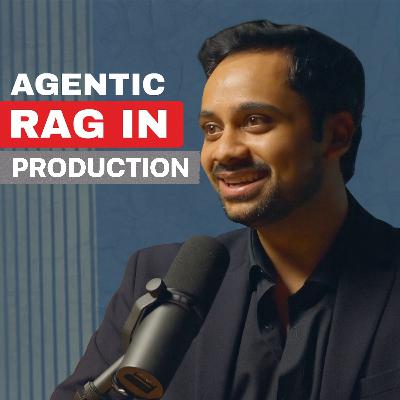
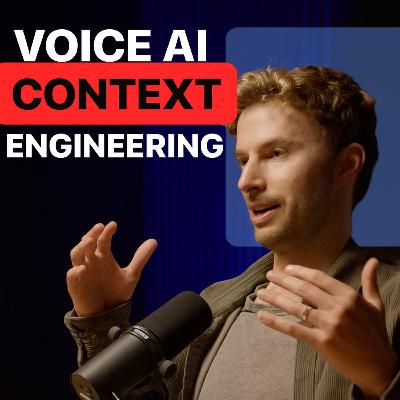
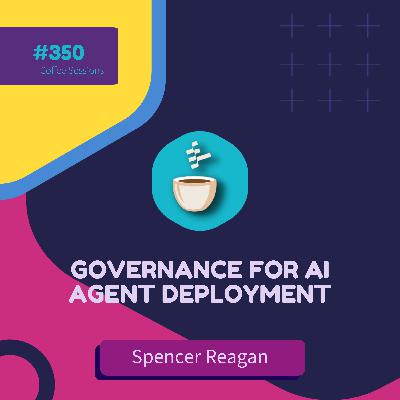
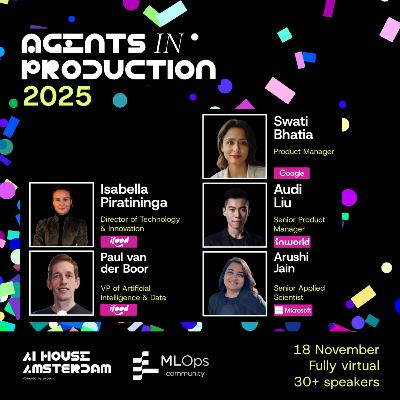
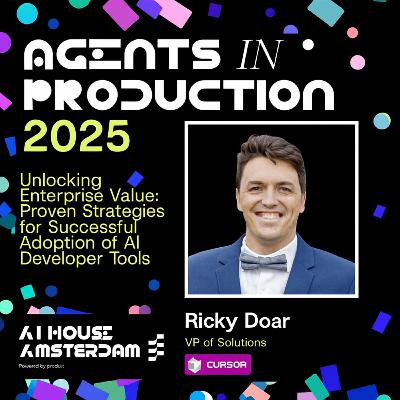
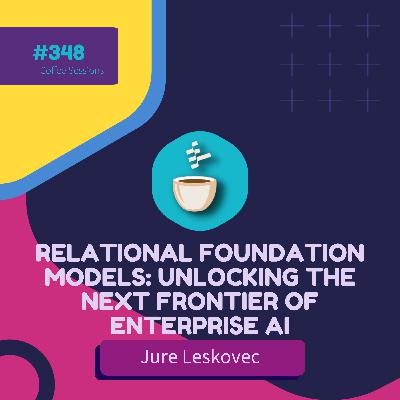



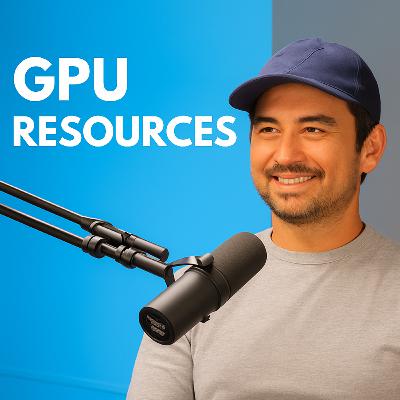



"in Kaggle you normally see a 1-1 ratio of positive to negative examples" huh? has he ever done a Kaggle competition? this statement is totally off